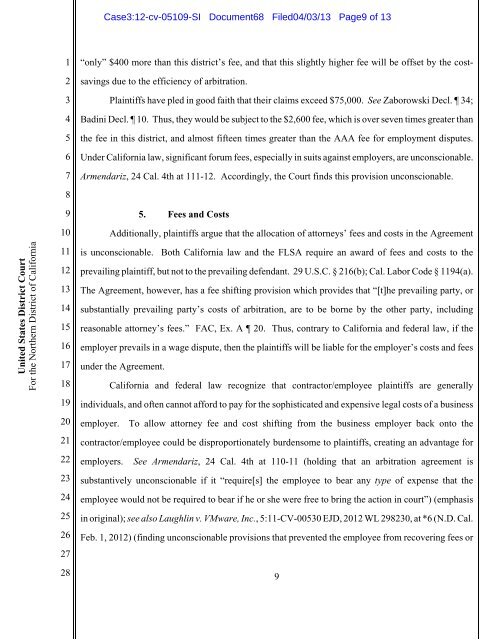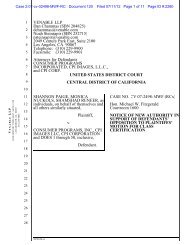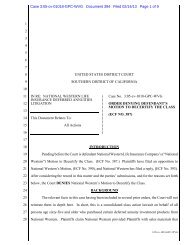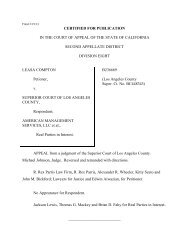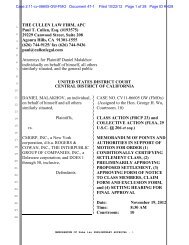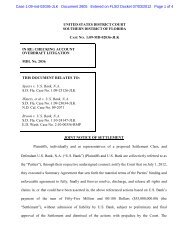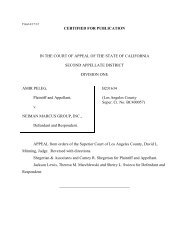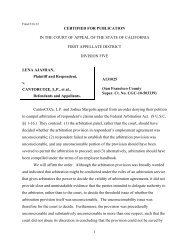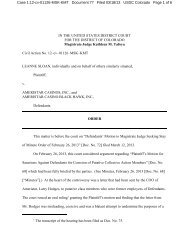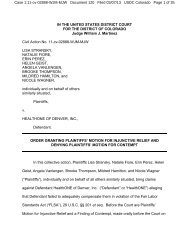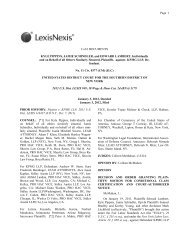order denying motion to compel arbitration - Impact Litigation Journal
order denying motion to compel arbitration - Impact Litigation Journal
order denying motion to compel arbitration - Impact Litigation Journal
Create successful ePaper yourself
Turn your PDF publications into a flip-book with our unique Google optimized e-Paper software.
Case3:12-cv-05109-SI Document68 Filed04/03/13 Page9 of 13<br />
1<br />
2<br />
3<br />
4<br />
5<br />
6<br />
7<br />
8<br />
“only” $400 more than this district’s fee, and that this slightly higher fee will be offset by the costsavings<br />
due <strong>to</strong> the efficiency of <strong>arbitration</strong>.<br />
Plaintiffs have pled in good faith that their claims exceed $75,000. See Zaborowski Decl. 34;<br />
Badini Decl. 10. Thus, they would be subject <strong>to</strong> the $2,600 fee, which is over seven times greater than<br />
the fee in this district, and almost fifteen times greater than the AAA fee for employment disputes.<br />
Under California law, significant forum fees, especially in suits against employers, are unconscionable.<br />
Armendariz, 24 Cal. 4th at 111-12. Accordingly, the Court finds this provision unconscionable.<br />
United States District Court<br />
For the Northern District of California<br />
9<br />
10<br />
11<br />
12<br />
13<br />
14<br />
15<br />
16<br />
17<br />
18<br />
19<br />
20<br />
21<br />
22<br />
23<br />
24<br />
25<br />
26<br />
27<br />
5. Fees and Costs<br />
Additionally, plaintiffs argue that the allocation of at<strong>to</strong>rneys’ fees and costs in the Agreement<br />
is unconscionable. Both California law and the FLSA require an award of fees and costs <strong>to</strong> the<br />
prevailing plaintiff, but not <strong>to</strong> the prevailing defendant. 29 U.S.C. § 216(b); Cal. Labor Code § 1194(a).<br />
The Agreement, however, has a fee shifting provision which provides that “[t]he prevailing party, or<br />
substantially prevailing party’s costs of <strong>arbitration</strong>, are <strong>to</strong> be borne by the other party, including<br />
reasonable at<strong>to</strong>rney’s fees.” FAC, Ex. A 20. Thus, contrary <strong>to</strong> California and federal law, if the<br />
employer prevails in a wage dispute, then the plaintiffs will be liable for the employer’s costs and fees<br />
under the Agreement.<br />
California and federal law recognize that contrac<strong>to</strong>r/employee plaintiffs are generally<br />
individuals, and often cannot afford <strong>to</strong> pay for the sophisticated and expensive legal costs of a business<br />
employer. To allow at<strong>to</strong>rney fee and cost shifting from the business employer back on<strong>to</strong> the<br />
contrac<strong>to</strong>r/employee could be disproportionately burdensome <strong>to</strong> plaintiffs, creating an advantage for<br />
employers. See Armendariz, 24 Cal. 4th at 110-11 (holding that an <strong>arbitration</strong> agreement is<br />
substantively unconscionable if it “require[s] the employee <strong>to</strong> bear any type of expense that the<br />
employee would not be required <strong>to</strong> bear if he or she were free <strong>to</strong> bring the action in court”) (emphasis<br />
in original); see also Laughlin v. VMware, Inc., 5:11-CV-00530 EJD, 2012 WL 298230, at *6 (N.D. Cal.<br />
Feb. 1, 2012) (finding unconscionable provisions that prevented the employee from recovering fees or<br />
28 9


